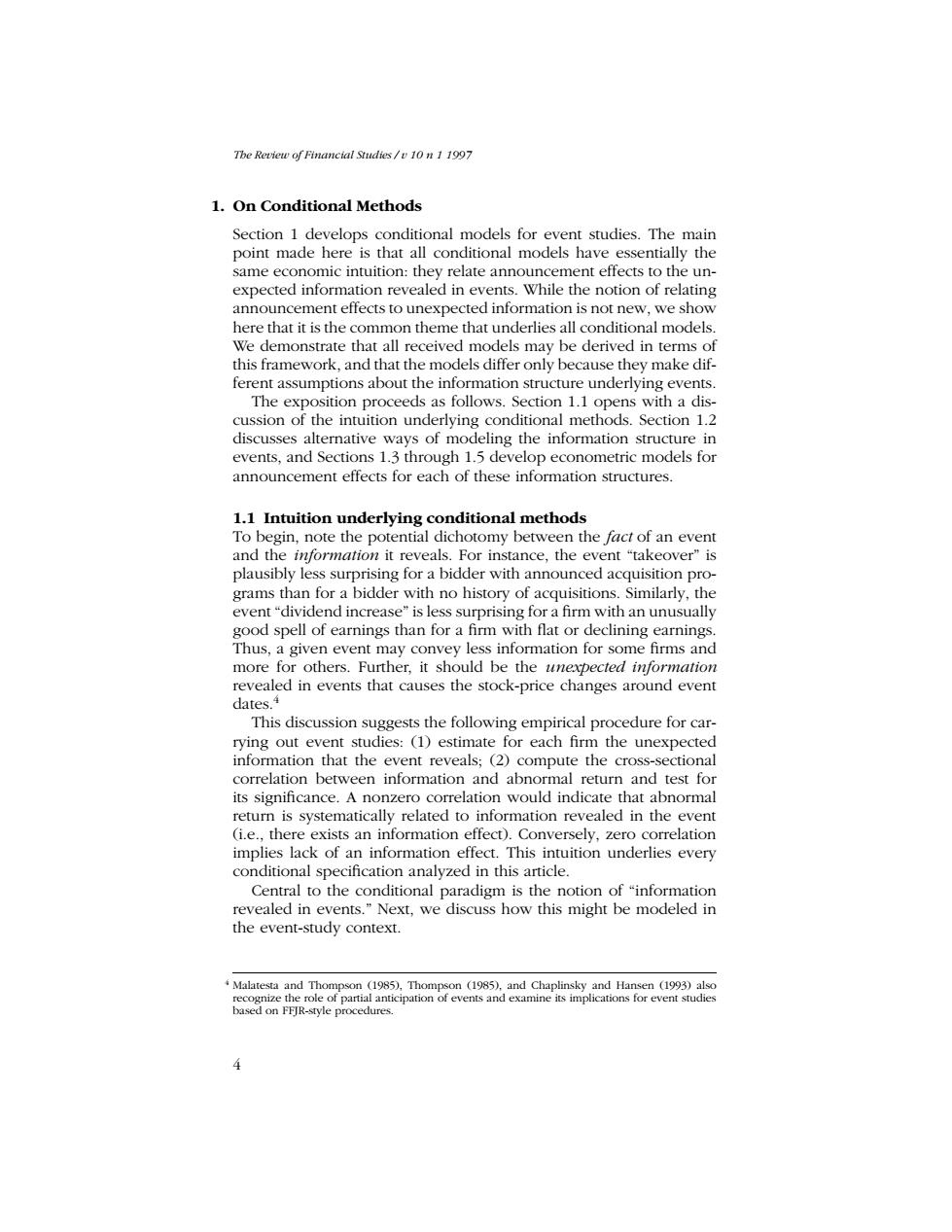正在加载图片...

Tbe Review of Financial Studies/v 10 n 1 1997 1.On Conditional Methods Section 1 develops conditional models for event studies.The main point made here is that all conditional models have essentially the same economic intuition:they relate announcement effects to the un- expected information revealed in events.While the notion of relating announcement effects to unexpected information is not new,we show here that it is the common theme that underlies all conditional models We demonstrate that all received models may be derived in terms of this framework,and that the models differ only because they make dif- ferent assumptions about the information structure underlying events. The exposition proceeds as follows.Section 1.1 opens with a dis- cussion of the intuition underlying conditional methods.Section 1.2 discusses alternative ways of modeling the information structure in events,and Sections 1.3 through 1.5 develop econometric models for announcement effects for each of these information structures. 1.1 Intuition underlying conditional methods To begin,note the potential dichotomy between the fact of an event and the information it reveals.For instance.the event "takeover"is plausibly less surprising for a bidder with announced acquisition pro- grams than for a bidder with no history of acquisitions.Similarly,the event"dividend increase"is less surprising for a firm with an unusually good spell of earnings than for a firm with flat or declining earnings. Thus,a given event may convey less information for some firms and more for others.Further,it should be the unexpected information revealed in events that causes the stock-price changes around event dates.4 This discussion suggests the following empirical procedure for car- rying out event studies:(1)estimate for each firm the unexpected information that the event reveals:(2)compute the cross-sectional correlation between information and abnormal return and test for its significance.A nonzero correlation would indicate that abnormal return is systematically related to information revealed in the event (i.e.,there exists an information effect).Conversely,zero correlation implies lack of an information effect.This intuition underlies every conditional specification analyzed in this article. Central to the conditional paradigm is the notion of"information revealed in events.Next,we discuss how this might be modeled in the event-study context. Malatesta and Thompson (1985),Thompson (1985),and Chaplinsky and Hansen (1993)also recognize the role of partial anticipation of events and examine its implications for event studies based on FFJR-style procedures.The Review of Financial Studies / v 10 n 1 1997 1. On Conditional Methods Section 1 develops conditional models for event studies. The main point made here is that all conditional models have essentially the same economic intuition: they relate announcement effects to the unexpected information revealed in events. While the notion of relating announcement effects to unexpected information is not new, we show here that it is the common theme that underlies all conditional models. We demonstrate that all received models may be derived in terms of this framework, and that the models differ only because they make different assumptions about the information structure underlying events. The exposition proceeds as follows. Section 1.1 opens with a discussion of the intuition underlying conditional methods. Section 1.2 discusses alternative ways of modeling the information structure in events, and Sections 1.3 through 1.5 develop econometric models for announcement effects for each of these information structures. 1.1 Intuition underlying conditional methods To begin, note the potential dichotomy between the fact of an event and the information it reveals. For instance, the event “takeover” is plausibly less surprising for a bidder with announced acquisition programs than for a bidder with no history of acquisitions. Similarly, the event “dividend increase” is less surprising for a firm with an unusually good spell of earnings than for a firm with flat or declining earnings. Thus, a given event may convey less information for some firms and more for others. Further, it should be the unexpected information revealed in events that causes the stock-price changes around event dates.4 This discussion suggests the following empirical procedure for carrying out event studies: (1) estimate for each firm the unexpected information that the event reveals; (2) compute the cross-sectional correlation between information and abnormal return and test for its significance. A nonzero correlation would indicate that abnormal return is systematically related to information revealed in the event (i.e., there exists an information effect). Conversely, zero correlation implies lack of an information effect. This intuition underlies every conditional specification analyzed in this article. Central to the conditional paradigm is the notion of “information revealed in events.” Next, we discuss how this might be modeled in the event-study context. 4 Malatesta and Thompson (1985), Thompson (1985), and Chaplinsky and Hansen (1993) also recognize the role of partial anticipation of events and examine its implications for event studies based on FFJR-style procedures. 4